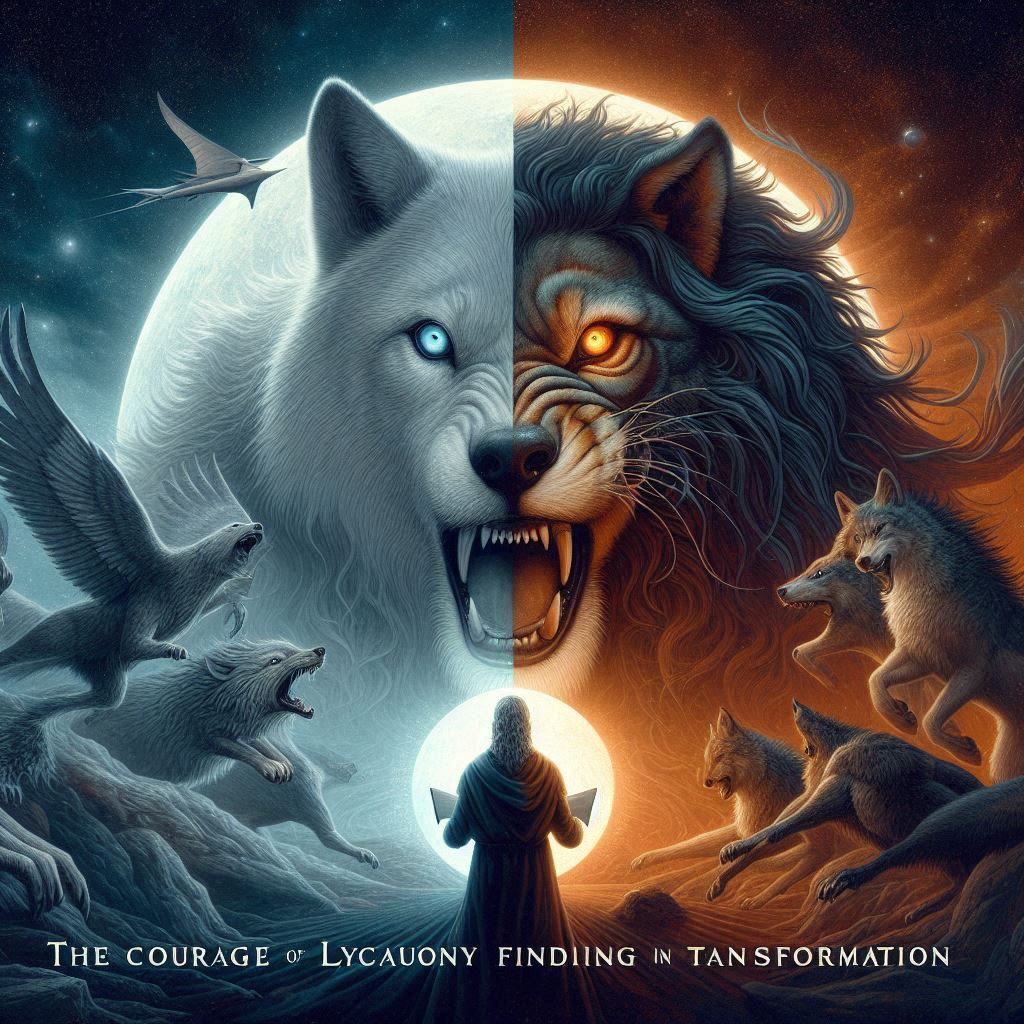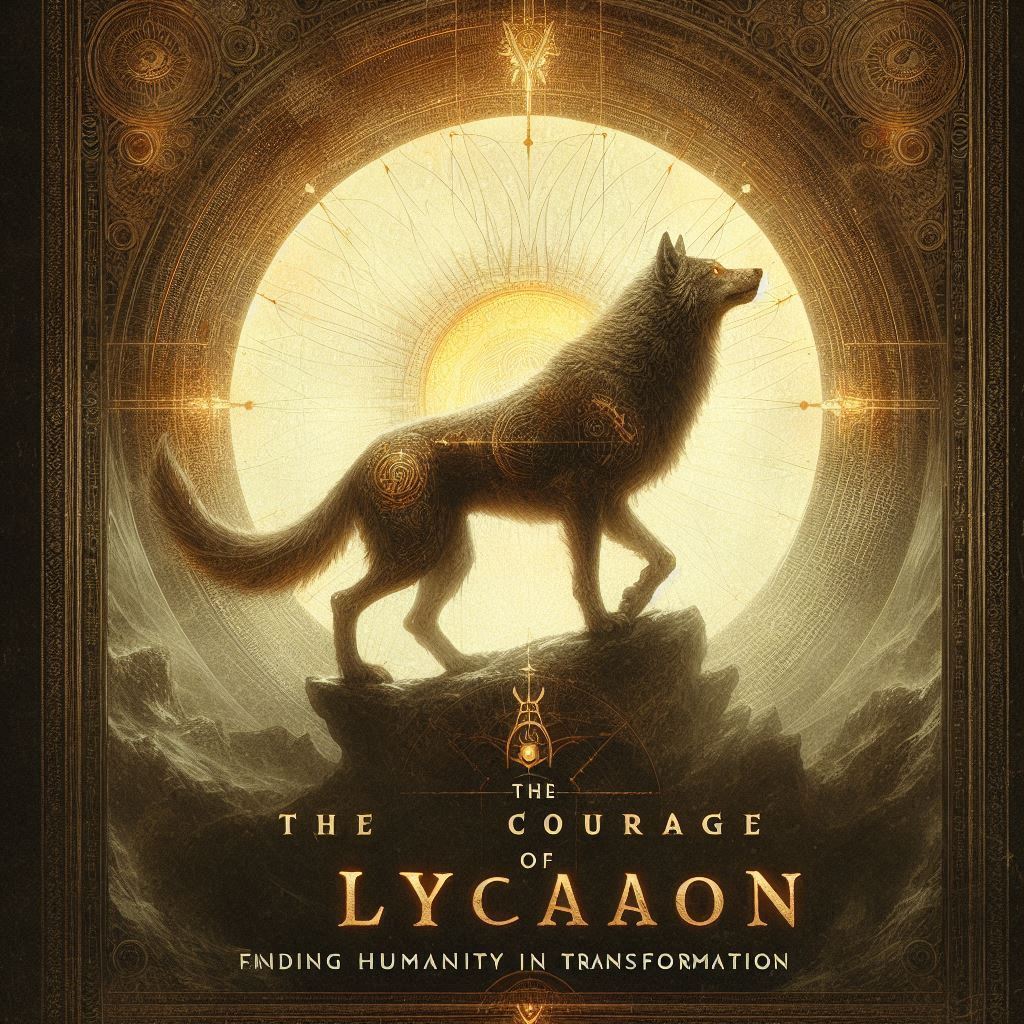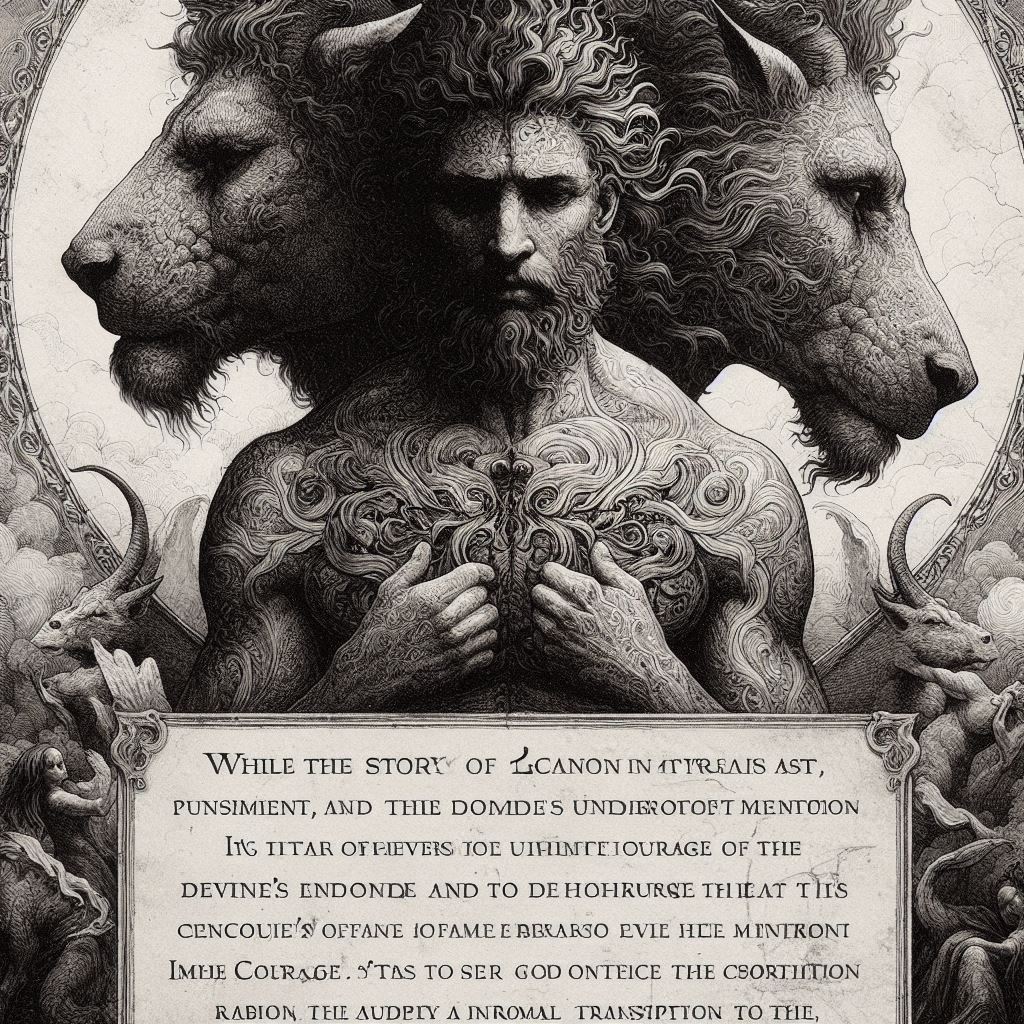The Courage of Lycaon

The Courage of Lycaon
The Courage of Lycaon: Finding Humanity in Transformation
Greek mythology is replete with tales of gods, heroes, and mortals whose lives are intertwined with lessons of morality, transformation, and redemption. Among these ancient stories, the myth of Lycaon stands out as a powerful narrative about the consequences of hubris and impiety, and the potential for finding humanity through profound transformation. While Lycaon’s story is often recounted as a cautionary tale about the dangers of defying the gods, it also offers a deeper exploration of courage, redemption, and the quest for inner humanity.
The Tale of Lycaon
Lycaon was the king of Arcadia, a region in ancient Greece known for its rugged terrain and untamed wilderness. He was a descendant of Pelasgus, one of the primordial figures in Greek mythology, and his mother was Meliboea (or Cyllene). Lycaon was renowned for his many sons, often said to be fifty in number, who were as notorious as their father for their impiety and arrogance.
Lycaon’s reputation for cruelty and sacrilege culminated in an audacious and blasphemous act. He sought to test the omniscience of Zeus, the king of the gods, by serving him a meal that included the flesh of a sacrificed child—variously described as one of his own sons or a Molossian captive. This horrific act of cannibalism was meant to deceive and challenge the divine authority of Zeus. The Courage of Lycaon
Zeus, in his righteous fury, was not deceived. Disgusted and enraged by Lycaon’s vile act, Zeus destroyed Lycaon’s palace with a thunderbolt and transformed the king into a wolf. This transformation was a fitting punishment, symbolizing Lycaon’s bestial nature and his descent into savagery.
Symbolism and Transformation

Lycaon’s transformation into a wolf is a powerful symbol within Greek mythology. The wolf, a creature often associated with wildness and ferocity, represents Lycaon’s inherent savagery and loss of humanity. However, this transformation also serves as a metaphor for the potential for change and redemption. The Courage of Lycaon
In ancient Greek culture, transformation myths often carry deeper meanings about the human condition. The metamorphosis of Lycaon can be interpreted as a journey of self-discovery and the potential for finding one’s true humanity through profound and often painful changes.
The Courage of Lycaon

While the story of Lycaon is traditionally viewed through the lens of punishment and divine retribution, a closer examination reveals themes of courage and the search for inner humanity. It takes immense courage to face the consequences of one’s actions and to undergo a profound transformation. Lycaon’s story, when seen from this perspective, becomes a narrative about the possibility of redemption and the strength required to embrace change.
1. The Courage to Confront One’s Actions: Lycaon’s initial act of sacrilege and his subsequent punishment by Zeus force him to confront the consequences of his impiety. The transformation into a wolf is not merely a punishment but an opportunity for introspection. It symbolizes the stripping away of his human façade and the need to confront his true nature. This confrontation requires courage, as it involves facing the darkest aspects of oneself. The Courage of Lycaon
2. Embracing Change: The metamorphosis from human to wolf represents a fundamental change in Lycaon’s identity. Embracing this transformation requires a willingness to let go of past transgressions and to adapt to a new existence. This willingness to change is a form of courage, as it involves stepping into the unknown and embracing a new way of being.
3. The Quest for Humanity: Despite his transformation into a beast, Lycaon’s journey can be seen as a quest to reclaim his humanity. The wolf, though a symbol of savagery, is also a creature of instinct and survival. Lycaon’s new existence as a wolf forces him to reconnect with the primal aspects of life and to find a new sense of purpose and identity. This quest for humanity within the confines of a beastly form is a powerful metaphor for the resilience of the human spirit. The Courage of Lycaon
Lessons for Modern Times

The myth of Lycaon offers timeless lessons that resonate with contemporary themes of personal growth, resilience, and the courage to change. In a world where individuals often grapple with their own inner demons and the consequences of their actions, Lycaon’s story provides a framework for understanding the process of transformation and redemption.
1. The Importance of Self-Reflection: Lycaon’s tale underscores the importance of self-reflection and the courage to confront one’s actions. In modern times, this translates to the need for introspection and accountability. Understanding and acknowledging one’s mistakes is the first step towards personal growth and redemption. The Courage of Lycaon
2. Embracing Change: Change is often accompanied by fear and uncertainty. Lycaon’s transformation into a wolf symbolizes the challenges and opportunities that come with change. Embracing change, whether it involves personal development, career shifts, or overcoming personal struggles, requires courage and resilience. Lycaon’s story encourages individuals to view change as an opportunity for growth and renewal.
3. Rediscovering Humanity: In an age where technology and social pressures often distance people from their true selves, Lycaon’s quest for humanity serves as a reminder of the importance of reconnecting with one’s core values and instincts. Finding humanity involves embracing empathy, compassion, and a sense of purpose. It requires a return to the fundamental aspects of what it means to be human. The Courage of Lycaon
Conclusion
The myth of Lycaon is a profound narrative about the consequences of hubris, the courage to confront one’s actions, and the transformative journey towards finding inner humanity. While traditionally viewed as a cautionary tale about the dangers of impiety, Lycaon’s story also offers valuable insights into the process of personal growth and redemption. By embracing change and seeking to rediscover their humanity, individuals can find the strength and courage to overcome their past transgressions and emerge stronger and more resilient. Lycaon’s journey, from king to wolf, serves as a timeless reminder of the power of transformation and the enduring quest for inner beauty and humanity.


